#echr ruling
Text
In a landmark decision, the European Court of Human Rights (ECHR) has today ruled that climate change violates the right to respect for one’s private and family life.
This is the main legal basis through which the court has previous rule on environmental cases, but an “historic” one regarding the climate crisis, observers say.
The case was brought by an association of older Swiss women concerned about the impact of global warming on their health, who claim the Swiss government is not taking enough action.
The ECHR ruled by 16 judges to 1 that the KlimaSeniorinnen (Swiss Elders for Climate Protection) were subject to a violation of Article 8 as well as (unanimously) Article 6 - the right to a fair trial in their country.
“While we do not have all the details yet - this decision is historic!” writes Sébastien Duyck, senior attorney at the Center for International Environmmental Law. “The Court has found the petition admissible and finds a violation of the rights of the Klimaseniorinnen both on process and on the substance!”
Two other climate cases - brought by a former French mayor, and six Portuguese youth - were found to be inadmissible, however.
[...]
Today, the Strasbourg Court declared that Article 8 of the European Convention on Human Rights encompasses a right to effective protection by the state “from the serious adverse effects of climate change on lives, health, well-being and quality of life”.
continue reading
This ruling could also apply to air ( e.g. PM2.5) and water pollution (e.g. PFAS), IMO.
#europe#switerland#eu#european court of human rights#echr ruling#climate change#government inaction#human rights violation
3 notes
·
View notes
Text
Success Story: Further Leave To Remain Granted Within 1 Hour
Our specialist immigration team has been successful in assisting our client (the “Applicant”) in an application for further leave to remain on the basis of her private and family life in the UK. The Applicant previously entered the UK back in 2016 on a Tier 4 Student visa. We had previously assisted the Applicant in obtaining leave to remain. As a result of our expertise and previous success, the…

View On WordPress
#Article 8 ECHR#eligibility requirements#Family and Private Life#Further Leave to Remain#Home Office#Immigration Policy#Immigration Rules#Indefinite Leave to Remain#Leave to Remain#Private Life#Right to Private Life#UK Immigration#UK Immigration Advice#UK Immigration Policy#UK Immigration Solicitors/ Lawyers
1 note
·
View note
Text

European Court Upholds Italy's Right to Seize Greek Bronze from Getty Museum
A European court on Thursday upheld Italy’s right to seize a prized Greek statue from the J. Paul Getty Museum in California, ruling that Italy was justified in trying to reclaim an important part of its cultural heritage and rejecting the museum’s appeal.
The European Court of Human Rights, or ECHR, determined that Italy’s decades-long efforts to recover the “Victorious Youth” statue from the Malibu-based Getty were not disproportionate.
“Victorious Youth,” a life-sized bronze dating from 300 B.C. to 100 B.C., is one of the highlights of the Getty’s collection. Though the artist is unknown, some scholars believe it was made by Lysippos, Alexander the Great’s personal sculptor.
The bronze, which was pulled from the sea in 1964 by Italian fishermen and then exported out of Italy illegally, was purchased by the Getty in 1977 for $4 million and has been on display there ever since.
The Getty had appealed to the European court after Italy’s high Court of Cassation in 2018 upheld a lower court’s confiscation order. The Getty had argued that its rights to the statue, under a European human rights protocol on protection of property, had been violated by Italy’s campaign to get it back.
The court ruled Thursday that no such violation had occurred.
“This is not just a victory for the Italian government. It’s a victory for culture,” said Maurizio Fiorilli, who as an Italian government attorney had spearheaded Italy’s efforts to recover its looted antiquities and, in particular, the Getty bronze.
The Getty has long defended its right to the statue, saying Italy had no legal claim to it.
Among other things, the Getty had argued that the statue is of Greek origin, was found in international waters and was never part of Italy’s cultural heritage. It cited a 1968 Court of Cassation ruling that found no evidence that the statue belonged to Italy.
Italy argued the statue was indeed part of its own cultural heritage, that it was brought to shore by Italians aboard an Italian-flagged ship and was exported illegally, without any customs declarations or payments.
After years of further legal wrangling, an Italian court in Pesaro in 2010 ordered the statue seized and returned, at the height of Italy’s campaign to recover antiquities looted from its territory and sold to museums and private collectors around the globe.
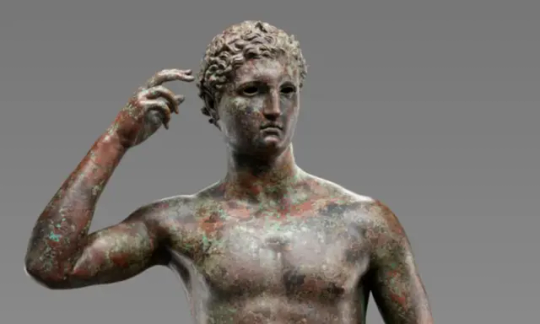
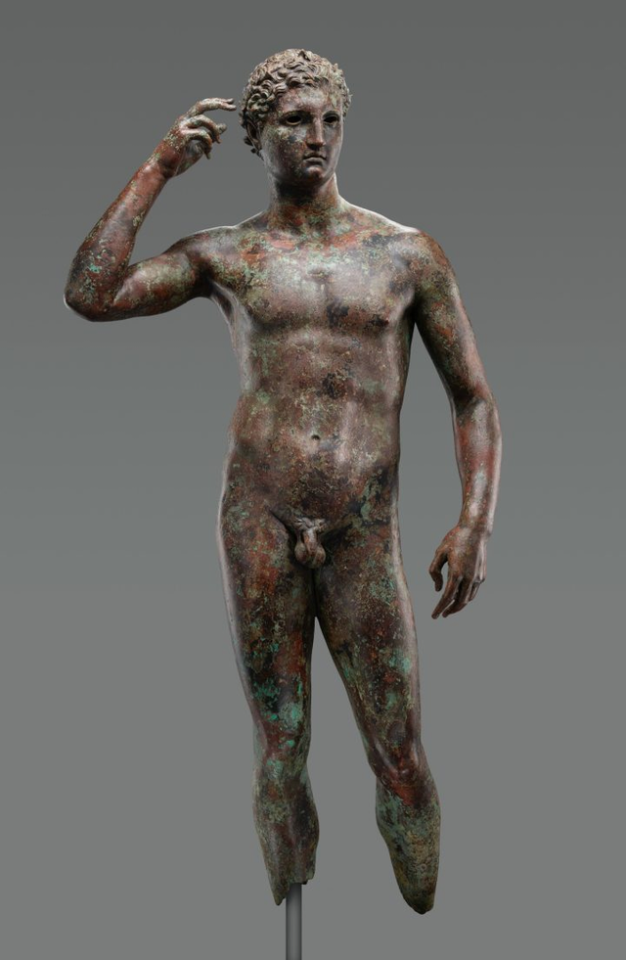

Thursday’s ruling by the Strasbourg, France-based ECHR was a chamber judgment. Both sides now have three months to ask that the case be heard by the court’s Grand Chamber for a final decision. But Thursday’s ruling was unanimous, with no dissenting judges, and the Grand Chamber can refuse to hear the case.
There was no immediate comment from the Getty, and its lawyers referred comment to the museum.
Italian Culture Minister Gennaro Sangiuliano praised Thursday’s decision as an “unequivocal ruling” that recognized the rights of the Italian state and its ownership of the statue.
“Following today’s ruling … the Italian government will restart contacts with U.S. authorities for assistance in the implementation of the confiscation order,” he said.
In a statement, he doubled down on Italy’s campaign to bring its looted treasures home, and noted that recently Italy has ceased cooperation with foreign museums that don’t recognize Italian legal confiscation orders.
Recently, Italy banned any loans to the Minneapolis Institute of Art following a dispute over an ancient marble statue believed to have been looted from Italy almost a half-century ago.
The Getty had appealed to the ECHR by arguing, among other things, that Italy’s 2010 confiscation order constituted a violation of its right to enjoy its possessions and that it would be deprived of that right if U.S. authorities carried out the seizure.
The ECHR however strongly reaffirmed Italy’s right to pursue the protection of its cultural heritage, especially from unlawful exportation.
“The court further held that owing, in particular, to the Getty Trust’s negligence or bad faith in purchasing the statue despite being aware of the claims of the Italian state and their efforts to recover it, the confiscation order had been proportionate to the aim of ensuring the return of an object that was part of Italy’s cultural heritage,” said the summary of the ruling.
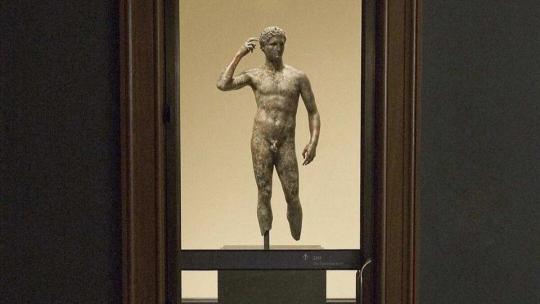
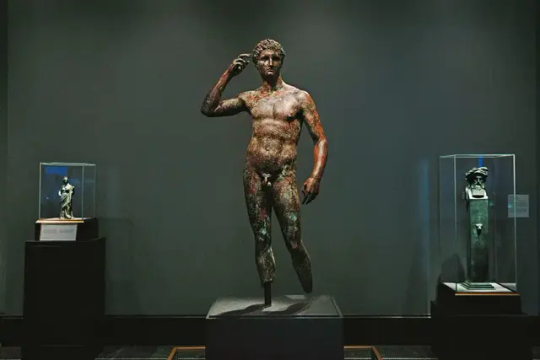
It wasn’t immediately clear what would happen next, though Fiorilli said the Getty had exhausted legal remedies and it’s now for U.S. the courts to enforce the Italian confiscation order.
“It’s not about guaranteeing the right to property, it’s about guaranteeing the internationally recognized value of every nation’s right to protect its cultural patrimony,” Fiorilli told The Associated Press over the telephone.
The statue, nicknamed the “Getty Bronze,” is a signature piece for the museum. Standing about 5 feet (1.52 meters) tall, the statue of the young athlete raising his right hand to an olive wreath crown around his head is one of the few life-sized Greek bronzes to have survived.
The bronze is believed to have sunk with the ship that was carrying it to Italy after the Romans conquered Greece. After being found in the nets of Italian fishermen trawling in international waters in 1964, it was allegedly buried in an Italian cabbage patch and hidden in a priest’s bathtub before it was taken out of the country.
Italy has successfully won back thousands of artifacts from museums, collections and private owners around the world that it says were looted or stolen from the country illegally, and recently opened a museum to house them until they can be returned to the regions from where they were looted.
The most important work to date that Italy has successfully brought back is the Euphronios Krater, one of the finest ancient Greek vases in existence. The Metropolitan Museum of Art in New York, which purchased it for $1 million in 1972 from an art dealer later accused of acquiring looted artifacts, returned it to Italy in 2008.
In 2010, the same year that Italy ordered the “Victorious Youth” statue confiscated from the Getty, a criminal trial ended in Rome against the Getty’s former curator of antiquities, Marion True. After years of trial, the Rome court ruled that the statute of limitations had expired on charges that True received stolen artifacts. She has denied wrongdoing.
In 2007, the Getty, without admitting any wrongdoing, agreed to return 40 ancient treasures in exchange for the long-term loans of other artifacts. Similar deals have been reached with other museums.
Under the 2007 deal, the two sides agreed to postpone further discussion of “Victorious Youth” until the court case was decided.
By Nicole Winfield.

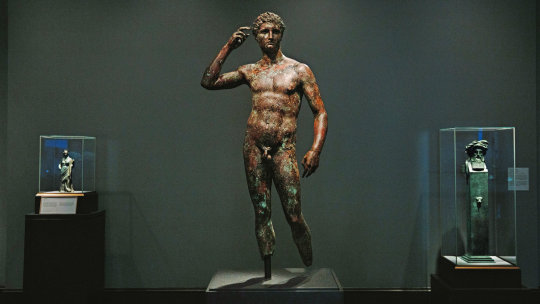
#European Court Upholds Italy's Right to Seize Greek Bronze from Getty Museum#J. Paul Getty Museum#bronze#bronze statue#bronze sculpture#getty bronze#Victorious Youth#ancient artifacts#archeology#archeolgst#history#history news#ancient history#ancient culture#ancient civilizations#ancient greece#greek history#greek art#ancient art#stolen art#looted art
97 notes
·
View notes
Text
In a landmark decision, the European Court of Human Rights (ECHR) has today ruled that climate change violates the right to respect for one’s private and family life.
The case was brought by an association of older Swiss women concerned about the impact of global warming on their health, who claim the Swiss government is not taking enough action.
The ECHR ruled by 16 judges to 1 that the KlimaSeniorinnen (Swiss Elders for Climate Protection) were subject to a violation of Article 8 as well as (unanimously) Article 6 - the right to a fair trial in their country.
“While we do not have all the details yet - this decision is historic!” writes Sébastien Duyck, senior attorney at the Center for International Environmmental Law. “The Court has found the petition admissible and finds a violation of the rights of the Klimaseniorinnen both on process and on the substance!”
Two other climate cases - brought by a former French mayor, and six Portuguese youth - were found to be inadmissible, however.
#solarpunk#solar punk#climate change#switzerland#inaction by government on climate change affects citizens welfare and human rights#legal case#law#europe
43 notes
·
View notes
Text
Spreading awareness. Please take the time to stop and read.
The UK Press is happy to report on every little comment that J K Rowling makes, or giving media coverage to the useless homophobic, transphobic and racist people who are in the race to running the UK.
Yet when it comes to trans teenagers actively fighting for their lives, it barely makes the news. No major presses are picking the story up, with the only reports being from the likes of Pink News (a queer news platform that many people might not have heard of/actively read from). Although some figures such as Stonewall co-founder Lisa Power have spoken about the protests, many people are still unaware, and the government will turn deaf ears.
Trans kids have been protesting on the ledge on the front of the NHS Offices in England since the 28th of July. They have not moved since, but have been joined by many other protestors under the age of 18.
This protest comes following the legislation from the UK Government and the parties currently to the right of the political spectrum, trying to ban gender-affirming care for youth by banning puberty blockers, as well as the attempt to enforce a rule to make schools forcibly out children if the school is aware if the child identifies other as a gender than assigned at birth.
Additionally, further rules are trying to be passed by the likes of the Tory government which would force trans women out of women-only spaces, under the presumption that they have 'fake transitioned to make it easier for them to be predators' (which is a law that is about transphobia and prejudice, they do not care about the safety of women, but that is a post for another time).
These laws will be catastrophic for young people in the UK, and if they are passed, we will see an increase of suicide rates in young people, as well as in increase in issues such as domestic abuse and bullying. That is not a guess, that is fact- it will happen.
These kids that are protesting at the NHS Offices are so brave. They are standing up to the political parties that are trying to pull out of the ECHR, people who don't care about the rights of the country, and people who push transphobic abuse in most speeches they make. They are being used as political pawns in the culture war currently happening in the UK.
So, if you have the opportunity to spread the word about these brave kids, please do. And if you have the opportunity to support them in person or protest in other places, please do.
133-155 Wellington Road, Waterloo.



#lgbtqia#lgbt#transgender#trans#trans youth#protests#the uk#england#the nhs#help protect trans kids#spread the word#reblog#anything you can do to help and to support#uk politics#tories#conservatives#labour#reform uk#lib dems#liberal democrats#greens#lowen on politics
26 notes
·
View notes
Text
Climate law experts are already calling it one of the most impactful rulings on human rights and climate change ever made. Today’s judgment, from the European Court of Human Rights (ECHR), was read out in front of an eclectic gathering of concerned plaintiffs from around the continent.
A group of older women from Switzerland, young people from Portugal, and a former French mayor—all had brought cases to the court alleging that their governments were not doing enough to battle the climate crisis now regularly ravaging Europe with heat waves, droughts, and other extreme weather.
While the ECHR, based in Strasbourg, France, chose not to admit two of the cases in question, it ruled that the Swiss women were right—their government had failed to do enough to meet the country’s responsibilities over climate change. What’s more, the women plaintiffs had also been denied their right to a fair trial in their country, the court found.
“It’s really a landmark judgement that was issued today, and it’s going to shape how all future climate change judgements are decided,” says human rights law researcher Corina Heri from the University of Zurich, who was present to hear the court’s decision for herself. “I was really relieved and very happy,” she adds, describing the moment when she heard the results of the judges’ deliberations.
Climate activist Greta Thunberg, who also attended the ruling, told reporters afterward that the world could expect more climate-change-related litigation.
The ECHR judges ruled 16 to 1 that the Swiss women—known as the KlimaSeniorinnen, or Senior Women for Climate Protection—had been subject to a violation of their human rights under the terms of the European Convention on Human Rights. The women had argued, for instance, that they were particularly vulnerable to the effects of heat waves.
Essentially, the ECHR has said it deems the Swiss government’s efforts on climate change mitigation to be insufficient. In the immediate aftermath of the ruling, Swiss president Viola Amherd told reporters that she would have to read the court’s judgement before commenting in detail.
“What Switzerland failed to do in the eyes of the court is, firstly, they don’t have a sufficient regulatory framework [for tackling climate change],” says Catherine Higham at the London School of Economics, who coordinates the Climate Change Laws of the World project. “They also felt there was evidence that Switzerland had inadequate 2020 targets and it failed to comply with those.” By 2020, the country had aimed to cut emissions by 20 percent from 1990 levels—however, emissions fell by only 14 percent.
The case brought by a former French mayor who said his town was at risk from rising sea levels was not admitted by the court because the man no longer lives in France. And the case by six Portuguese young people, penned in response to devastating wildfires in 2017, was also not admitted—partly because the plaintiffs did not bring their case in their own country before approaching the ECHR.
Despite this, the positive ruling for the KlimaSeniorinnen is being touted as hugely significant by legal experts. In this case, the court did not accept complaints from individuals within the group, but it did accept complaints made by the group itself as an organization—a distinction that could influence how people collectivize and approach European courts with similar cases in the future, says Heri.
She adds that there was a possibility the court could have ruled that the European Convention on Human Rights doesn’t actually require climate action. Had that happened, it could have undermined existing rulings made in European domestic courts that have demanded tougher climate policies from governments. For example, the Brussels Court of Appeal ruled last year that Belgium must cut its emissions by 55 percent from 1990 levels by 2030.
Today’s judgement comes following years of climate-change-related litigation gathering pace in courts around the world. In the US in 2023, for example, a judge ruled that the state of Montana was violating the right of 16 young people to a “clean and healthful environment.”
Higham says the ECHR’s ruling is “likely to have ramifications around the world.” She notes that, globally, there are around 100 similar cases in progress at various courts, also challenging governments over their climate change mitigation efforts. Heri agrees, noting that the ECHR is viewed globally as a highly influential international court.
Jorge Viñuales at the University of Cambridge, who specializes in law and environmental policy, says it is notable that Switzerland has been found to have fallen foul of human rights legislation, despite the fact that the country has relatively good climate policies. He criticizes the ECHR’s decision not to admit the case brought by the Portuguese young people, however. Part of the court’s reasoning was that their case was targeted not just at Portugal but every EU member state and five other countries. “The court seems to misunderstand that the climate system is everywhere and that effective control over the source of harm is what should count,” says Viñuales.
A big question around climate-change-related legal cases is over their impact—do they actually have enough clout to steer countries and large corporations toward reducing emissions faster than planned? Higham says there is evidence that this is already happening. In the Netherlands, the country’s Supreme Court ordered the government to slash emissions by 15 megatonnes in 2020, and a sharp drop in emissions followed. “We do see policy changes in the Netherlands that seem to be influenced by that judgement,” says Higham.
The ECHR ruling could also reignite cases that have struggled in some nations under the ECHR’s jurisdiction, such as the UK. This is “immensely significant,” says Tim Crosland, director of Plan B, a legal group that challenged the UK government over its climate policies but ultimately lost the case in 2021. “The High Court said, ‘Your fundamental problem is there is no precedent from Strasbourg to support your position that fundamental rights have been violated,’” says Crosland. “Well, now there is.”
Defendants in future cases may feel that their country’s own emissions are only a fraction of those responsible for climate change, and that therefore it is unfair to single one state out over many others. However, the ECHR ruling does not exaggerate nations’ individual duties, says Crosland. Each state has a share of the world’s carbon budget for keeping global warming to, for example, less than 1.5 degrees Celsius.
“Obviously, Switzerland isn’t responsible for emissions from the US or from China, but it’s responsible for its own emissions—and that’s what the judgement says,” he explains.
20 notes
·
View notes
Text
Lithuania broke European human rights laws by allowing the CIA to subject an alleged 9/11 suspect to “inhuman treatment” in a secret interrogation centre in the Baltic country, the European court of human rights has ruled.
The court said Mustafa Ahmed Adam al-Hawsawi raised multiple complaints of torture, ill treatment and unacknowledged detention in 2005-2006 when he was held at a secret facility in Lithuania run by the CIA. Hawsawi is now held in Guantánamo Bay on suspicion of being a facilitator and financial manager of al-Qaida.
While held in Lithuania, he experienced an extremely harsh detention regime, according to the press release, including solitary confinement, the continuous use of leg shackles and exposure to noise and light.
“The cumulative effects of such a detention regime had amounted to inhuman treatment within the meaning of the [European] convention [on human rights], which the Lithuanian authorities had enabled by cooperating with the CIA,” the release said.
Asked for comment, the Lithuanian embassy in Washington pointed to an article published by the Baltic News Service quoting Lithuania’s justice ministry as saying Lithuania would comply with the court’s decision to award Hawsawi €100,000 ($108,750) in compensation.
The chamber held unanimously that there had been violations of the prohibition of inhuman or degrading treatment or investigation because of Lithuania’s failure to effectively investigate Hawsawi’s allegations “and because of its complicity in the CIA secret detainee programme”.
It also held that there were violations to articles relating to the rights to a fair trial and life, as well as abolition of the death penalty, according to the press release, because Lithuania assisted Hawsawi’s “transfer from its territory in spite of a real risk that he could face a flagrant denial of justice and the death penalty.”
16 Jan 24
30 notes
·
View notes
Text
The arc of justice finally bends against Big Oil
Sabrina Haake
April 14, 2024 6:15AM ET

An oil refinery blow off stack is seen, Sept. 16, 2008, in Texas City, Texas. (Photo by Mark Wilson/Getty Images)
This article was paid for by Raw Story subscribers. Not a subscriber? Try us and go ad-free for $1. Prefer to give a one-time tip? Click here.
In an historic ruling that could change the trajectory of a rapidly heating planet, a court of law with binding jurisdiction over most of Europe has ruled that governments can be held liable for inadequate responses to climate change.
The European Court of Human Rights determined that rising temperatures in Switzerland caused direct and tangible health consequences among Swiss citizens, and that governments failing to take adequate steps to mitigate and reduce greenhouse gas emissions could owe damages to people hurt by their inaction.
So what, in practical terms, does this mean for a planet that is literally burning in an increasing number of locations?
Europe could take climate cases in a new direction
The ECHR ruling is unprecedented in several respects, beginning with its reliance on principles of human rights.
The Court ruled that governments failing to do enough to address climate change were violating the European Convention on Human Rights, which holds as its first tenet that, “Everyone’s right to life shall be protected by law.” By failing to meet its own climate goals, the court held, the Swiss government impaired citizens’ fundamental rights to life.
The plaintiffs themselves were also unique. In climate cases pending around the world, including in the United States, the vast majority of plaintiffs are young people worried about how they will survive on a sweltering planet with rapidly disappearing habitats and resources.
ALSO READ: 15 worthless things Trump will give you for your money
The ECHR case, in contrast, was brought by elderly plaintiffs, most of whom were women in their 70s who proved that their age and gender make them particularly vulnerable to health risks linked to climate change. Heatwaves, in particular, can be deadly for the elderly as excessive heat triggers a strained cardiovascular response. Cognizant of their own time limitations, these women sued to benefit the next generation. One plaintiff told the BBC, “We know statistically that in 10 years we will be gone. So whatever we do now, we are not doing for ourselves, but for the sake of our children and our children's children.”
Because there is no avenue for appeal, the ECHR ruling will directly influence energy policy throughout the industrialized economies of Europe. Although it falls to Switzerland to comply with the ruling, its precedent is legally binding on all 46 member states, including Germany, the U.K., France and Italy — all fuel-burning heavy hitters.
Climate challenges in the U.S.
The European Court ruled that Switzerland’s efforts to reduce carbon emissions had been “woefully inadequate.” Although the ruling isn’t binding on U.S. courts, the domestic fossil fuel industry will be directly affected by it, since the U.S. has recently become the biggest supplier of crude oil to the European Union.
ALSO READ: Revealed: What government officials privately shared about Trump not disclosing finances
Climate litigants in the U.S. follow a different strategy. State and local governments are now suing fossil fuel companies and the American Petroleum Institute for damages caused by climate change — astronomical damages that inevitably fall to states, cities and towns that can’t afford to pay for them.
These climate cases name private fossil fuel companies as defendants, seeking to hold responsible various for-profit companies, including BP, Chevron, ConocoPhillips, ExxonMobil and Shell, for increasing carbon dioxide and methane emissions caused by their products.
Big Oil’s campaign of deception
Legal claims and allegations pending in the U.S. focus largely on Big Oil’s deceptive practices. Like the tobacco disinformation cases from the 1990s, these cases allege fraud, nuisance, conspiracy and negligence arising from the industry’s long-standing public disinformation campaigns.
Congress has conducted numerous investigations into Big Oil’s pattern of deception. Despite conclusive evidence that oil executives have long known the causal connection between fossil fuels and climate change, industry executives have consistently lied about it to protect their profits.
Nearly 10 years ago, Democratic members of Congress addressed a report by the Union of Concerned Scientists concluding that “there was a coordinated campaign of deception” on climate science by ExxonMobil, Chevron, ConocoPhillips, BP, Shell, Peabody Energy and other members of the fossil fuel industry.

Tanker drivers working for Shell in Grangemouth, Scotland. (Photo by Jeff J Mitchell/Getty Images)
Big Oil’s targeted acts of deception over a decades-long campaign included “forged letters to Congress,” secret funding of allegedly independent but industry-controlled scientists, creating “fake grassroots organizations” to influence policy, and multiple, ongoing, and in-depth “efforts to deliberately manufacture uncertainty about climate science.”
Evidence of the industry’s deceptive practices could be pivotal in cases brought by state and local governments paying a staggering tab for intensifying storms, flooding, crop-destroying droughts, extreme heat events and, for states and towns on major bodies of water, coastal erosion.
In the meantime, the fossil fuel industry continues to profit outrageously from extracting, distributing and marketing dangerous products known to increase Earth’s already feverish temperature: March was the 10th month in a row to set a new monthly global heat record, both on land and in the oceans, as global reliance on coal — the dirtiest fossil fuel of all — continues to climb.
Landmark climate cases in Montana, Hawaii
The ECHR decision was the first to rule that governments are obligated under human rights laws to address climate change, but it won’t be the last. Cases pending in Montana and Hawaii also allege damages from unmet climate obligations by their respective state governments.
Last August, 16 young plaintiffs scored an unprecedented victory in Montana. They argued that the state violated a state constitutional provision that guarantees Montana citizens a healthy environment, and Judge Kathy Seeley agreed. She ruled that permitting coal, oil and gas production worsened the climate crisis, in violation of the “healthy environment” guarantees found in the Montana constitution.
In result, state regulators issuing permits for fossil fuel developments must now consider the effects of greenhouse gas emissions as part of their overall analysis of whether to grant or deny the permit. After the state appealed the maverick ruling, Montana’s Supreme Court, in a 5-2 decision, denied the governor’s request to block the ruling pending appeal.
In Hawaii, another pending climate case involves 14 youths. Plaintiffs in Hawaii allege that the state’s transportation department, by funding highway projects that increase fuel consumption and greenhouse gas emissions, violated a constitutional duty to protect the environment.
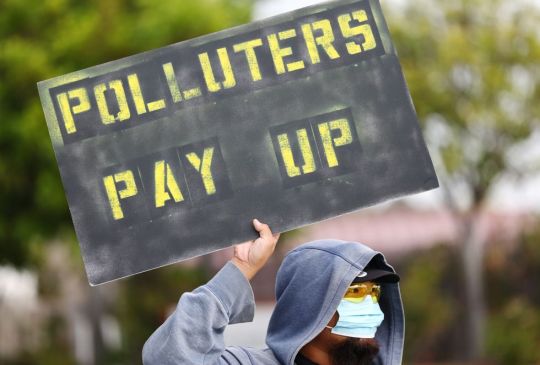
A protestor holds a 'Polluters Pay Up' sign outside the Phillips 66 Los Angeles Refinery Wilmington Plant on Nov. 28, 2022, in Wilmington, Calif. (Photo by Mario Tama/Getty Images)
After the state challenged plaintiffs’ standing, claiming they could not show particularized harm because climate damages are already “baked in,” the judge ruled that climate damages to plaintiffs “are not hypothetical,” and allowed the case to proceed.
When the state asked Hawaii’s legislators for more than $2 million to hire outside counsel to fight the case, one state legislator told Hawaii Public Radio that instead of “spending the millions of dollars we’re spending on some hotshot law firm,” Hawaii should apply that money toward emissions reductions instead.
The case was scheduled for trial this summer, but in February, the fossil fuel defendants petitioned the U.S. Supreme Court, claiming that federal law precludes damages claims against them.
Take heart, then take action
Climate activists should be uplifted and encouraged by the ECHR decision, particularly as its effects begin to ripple through the fossil fuel industry, industrialized economies and reluctant courts.
It won’t change the prognosis or the immediate future — today’s youth throughout the world will still live through the worst effects of climate destruction, even though they had nothing to do with the policies that caused it.
It’s the same lament heard from emerging economies in Asia and Africa. Struggling countries and coastal populations who had nothing to do with industrialization over the past 150 years are now paying the steepest price through their own rapidly disappearing habitats.
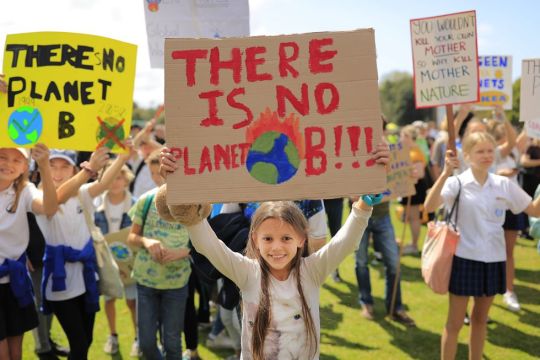
Thousands of school students join protesters in a Climate strike rally on September 20, 2019, in Sydney, Australia. (Photo by Mark Evans/Getty Images)
But one major, outcome-determinative difference between these two rightfully aggrieved populations remains: the right to vote.
As enraging as it is for young Americans to hear oil-financed politicians deny climate change (“Drill baby, drill!”), we could fund the transition to clean energy — including an upgraded, nationwide grid of sufficient capacity — if every young adult simply voted.
Sabrina Haake is a columnist and 25 year litigator specializing in 1st and 14th Amendment defense. Follow her on Substack.
11 notes
·
View notes
Text
European Jewish leaders have sharply criticized a ruling by the European Court of Human Rights (EHCR), which upheld a ban on kosher slaughter in Belgium, slamming it as a significant setback for religious freedom across Europe.
Dismissing legal and humanitarian appeals by Belgium’s Jewish community and Jewish leaders worldwide, the seven-judge panel in the Strasbourg court—the EU’s highest judicial body– invoked “the protection of animal welfare” as “an ethical value” that supersedes the Jewish and Muslim religious mandates.
The judges confirmed the ban already in place in Belgium that insists that animals be “stunned” prior to slaughter, regardless of Jewish law and Islamic practice that forbid it.
Rabbi Pinchas Goldschmidt, President of the Conference of European Rabbis and Russia’s chief rabbi, called the ruling “a black day for Europe, when fundamental religious rights are no longer respected.”
“The court’s decision to enforce the ban on ritual slaughter in the Flanders and Wallonia regions of Belgium will be felt by Jewish communities across the continent,” Rabbi Goldschmidt said. “The bans have already had a devastating impact on the Belgian Jewish community, causing supply shortages. And we are all very aware of the precedent this sets in challenging our rights to practice our religion.”
Belgium is home to some 500,000 Muslims and 30,000 Jews. Those who want to observe shechitah and Muslim ‘halal’ must now obtain meat from abroad.
“This distorted verdict implies that the rights of citizens to freedom of religion and worship are of lower importance than the “rights” of animals,” said Rabbi Menachem Margolin, chairman of the Brussels-based European Jewish Association. He warned that the restrictions on Jews practicing their faith will lead to “serious damage to the fabric of life throughout the continent.”
Fearing A Domino Effect
By upholding the Belgian ban, the EU Court of Human Rights has effectively signaled other states within the European Union that they can implement their own laws prohibiting kosher slaughter for Jews and halal slaughter for Muslims, without fear of religious discrimination lawsuits.
The threat of legal consequences has until now acted as a brake on the anti-shechitah movement. But the EUHR ruling has removed that barrier, setting the stage in an expected domino effect for a wave of copycat restrictions on ritual slaughter by European governments.
“We are already seeing attempts across Europe to follow this Belgian ban, now sadly legitimized by the ECHR,” Dr. Ariel Muzicant, president of the European Jewish Congress, said in a statement.
The bans, imposed in the two regions several years ago, were the result of a long-running campaign by animal welfare activists. But they also raised fears among Muslim and Jewish community groups that they were “a cover for nationalist politicians to foster anti-immigrant sentiment,” reported Politico.
Ben Weyts, the Flemish minister responsible for animal welfare, was the first to propose the idea of a ban and expressed satisfaction with the verdict. “Now the door is open for a ban on ritual slaughter not only in Brussels but in the whole of Europe,” Weyts, of the far-right New Flemish Alliance, gloated in a television interview.
Yohan Benizri, president of the Belgian Federation of Jewish Organizations that opposed the slaughter ban, said he was “appalled” by the ruling. “This is the first time that the ECHR decides that protection of animal welfare is a matter of public morals that can trump the rights of minorities,” Benizri told Politico.
Hostility To Shechitah Deeply Rooted in European History
The hostility to shechitah endorsed by the Strasbourg court hardly comes as a shock; that animus has underpinned Belgian society for generations, deeply rooted in a legacy of Jew-hatred that has flourished throughout European history.
Blood libels across the ages have been fueled by malicious portrayals of shechitah as barbaric and cruel. Grotesque carvings on countless medieval church facades depicting Jews in obscene acts with pigs, on display to this very day, continue the tradition of mocking Jewish dietary restrictions.
Several European countries in the 19th and 20th Centuries oppressed their Jewish populations with bans against shechitah. Switzerland did so in 1893 to stop Jews fleeing pogroms from entering their country. Poland enacted a similar ban in 1936, Sweden in 1937.
Germany passed anti-shechitah laws three months after the Nazis came to power in 1933, citing cruelty to animals, and maligning kosher slaughter as a Jewish celebration of animal suffering. One of the first acts of the Nazi regime, the laws banning shechitah were aimed at making Germany unlivable for Jews, forcing them to emigrate.
Legislation prohibiting shechitah often follows the Nazi model, masquerading under the banner of animal welfare, and fueled by the canard that kosher slaughter inflicts undue suffering on animals. This misconception has persisted through generations and continues to resonate in various parts of the world.
In 2009, bowing to pressure from liberals and parties hostile to Jews and Muslims, the EU Council implemented the pre-slaughter stunning law. Following outcries from religious groups, the law made allowances for member States to provide exemptions to accommodate ritual slaughter by Jews and Muslims.
A number of countries including France, Germany, Luxembourg, Cyprus and Spain make use of that exemption. Other European countries refuse to grant any exemptions from the stunning law. These include Sweden, Norway, Iceland, Denmark, Cyprus, Spain, Slovenia, and now Belgium.
Five Years of Court Battles
The Strasbourg court’s ruling marked the culmination of legal battles waged by Jewish and Muslim groups, together with seven advocacy groups, against bans enacted in 2017 and 2018 in Flanders and Wallonia against shechitah and Islamic ritual slaughter.
The bans were pushed through the Belgium parliament by an alliance of anti-shechitah forces, animal rights groups and anti-Muslim politicians.
The litigants first brought a religious discrimination lawsuit in a Belgium court, then at the European Court of Justice in Luxembourg in 2020, and finally the European Court of Human Rights in Strasbourg.
Their appeals argued that the laws violate guarantees of religious freedom enshrined in EU law; in the Charter of Fundamental Rights of the European Union; the European Convention on Human Rights; and the Belgian Constitution itself.
The Strasbourg court dismissed their arguments, stating that animal welfare was a component of “public morals” and carried significant weight in modern-day democracies.
Critics have drawn attention to Articles 9 and 14 under the European Convention of Human Rights, formulated in 1953, which protects the political and civil rights of Europeans. Its provisions guarantee freedom of thought, conscience and religion.
Muzicant said the Strasbourg court, in upholding the anti-shechitah law, “had violated the very charter” from which it draws its authority.
“We call on the European Commission and European Parliament to enact legislation which truly protects these fundamental rights and to give real meaning to their long-stated claims that they foster Jewish life in Europe,” Muzicant affirmed on the EJC website. “Jewish communities in Europe, now more than ever, need the protection of national governments and pan-European organizations to ensure that thousands of years of Jewish life on this continent do not come to an abrupt end.”
“Restrictions on fundamental aspects of Jewish religious freedom of expression, coupled with a background of massive increases in anti-Semitic attacks on Jewish communities, lead us to seriously consider whether Jews have a future in Europe,” the EJC representative said.
The EU Lowers Its Mask
Commenting on the Strasbourg court ruling upholding Belgium’s anti-shechitah ban, noted British political commentator Melanie Philips mocked the EU for its hypocrisy.
“The European Union likes to pose as the embodiment of tolerance, freedom and all civilized values. Now it has ripped off its own disguise to reveal something rather more ugly,” she wrote in the Jewish Star.
“The idea that stunning is humane is laughable,” Philips elaborated. “It’s often ineffective, causing the animal to be subjected to this assault more than once before it eventually loses consciousness. And even with prior stunning, meat processing plants in Europe are often inhumane places where livestock are factory farmed, pumped full of chemicals and industrially killed.”
So if the requirement for stunning actually has little to do with animal welfare, what’s the real driving force behind it?
At its core, writes Phillips, the law reflects a switch in priorities; animals being given priority over basic human rights, with a corresponding rise in ignorance and hypocrisy over what actually constitutes animal welfare.
“That moral confusion is one of the outcomes of the dogma of secularism, as well as the hostility to religion upon which the EU itself is based,” writes the author. Another key factor contributing to Western decay is its “moral and cultural relativism,” which preaches there are no absolute values.
“All of these [dark forces] have propelled the rise of paganism and the veneration of the animal at the expense of humanity.”
Pitfalls of Stunning an Animal
The practice of “stunning” refers to the methods of rendering an animal or bird unconscious prior to slaughter.
It was originally developed to facilitate the killing of large numbers of animals at once, in factory-like conditions. The main stunning method used for slaughtering cattle and sheep is by captive bolt gun, in which a steel bolt is shot into the skull at the front of the animal’s brain, details the National Institute Health.
Another method is by electric shock, whereby electrodes are clamped to the animal’s head and heart, electrocuting it.
These methods are contrary to Jewish law which stipulates that an animal intended for food must be healthy and uninjured at the time of shechitah. Stunning injures and sometimes kills the animal, in either case rendering it forbidden for Jews to eat.
Apart from the halachic prohibition, there are other objections to stunning. Despite the rhetoric from animal rights activists, there is no conclusive evidence that stunning an animal renders it insensible to pain, experts say.
Some scientists claim that the animal is often only paralyzed—not fully sedated—and thus prevented only from displaying its pain.
In addition, when the captive bolt method fails, as happens not infrequently, it inflicts considerable suffering and distress on the animal. The conscious animal is left in acute pain as the captive bolt gun is reloaded and reapplied, or the electrical tongs reapplied to re-stun it.
According to Britain’s Royal Society for the Protection of Animals (RSPCA), stunning is done differently for poultry. “Birds are hung upside down by their legs on metal shackles along a moving conveyor belt,” the RSPCA details.
“They move along the production line to a stunning water bath; when the bird’s head makes contact with the water, an electrical circuit between the water bath and shackle is completed, which stuns the bird. The conveyor belt then moves the birds to a mechanical neck cutter, which cuts the major blood vessels in the neck.”
Shechitah avoids all the technical risks and humanitarian pitfalls of stunning. Yet, in one of the supreme ironies of this world, despite the gruesome, torturous nature of non-kosher slaughter, it is shechitah with its meticulous laws aimed at minimizing animal suffering that is being painted as barbaric and cruel.
*****
Why Isn’t Stunning Required for Animals Killed in Belgian Sporting Events?
One of the EJC’s earliest legal appeals drew attention to the discriminatory nature of the Belgian anti-shechitah legislation, noting that hunting and killing animals in sporting events are not subject to any of the “humane” regulations that have been imposed on ritual slaughter.
On the contrary, the laws governing the popular activity of game-hunting in Belgium, whether for recreation of food consumption, make no reference whatever to the welfare of animals. The law’s concern instead is over environmental protections.
As a feature article in Flanders Today makes clear, the government’s aims in regulating hunting are purely environmental; to ensure that the region’s wildlife supply is not significantly reduced and that no damage is done to the land.
The article goes on to enthuse about the opportunities for hunting wild game in Belgian resort areas. “Hunting wild game in the winter is a hit among hunters, butchers and consumers,” the article begins, going on to list “deer, wild boar, partridge, ducks and pheasant” as “huntable animals.”
The Jewish community’s appeal challenged the double standard inherent in these hunting laws. It argued that since the law in Belgium permits the hunting and killing of animals at “cultural or sporting events” without prior stunning, how can the same government impose “stunning” requirements on ritual slaughter?
The court’s response exposed its show of caring about animal welfare as empty posturing.
“Cultural and sporting events result at most in a marginal production of meat which is not economically significant,” the court said. “Consequently, such events cannot reasonably be understood as a food production activity, which justifies their being treated differently from slaughtering.”
What does that gibberish mean? What does food production have to do with the obligation to spare an animal from undue suffering?
What the court seemed to be saying was that imposing humanitarian restrictions on game-hunting will make no economic dent on Jewish or Muslim meat-production industries (and by association, on Jewish or Muslim immigration), so why make a fuss over whether hunting game is done humanely?
In other words, hunt and kill for sport however you please, gentlemen, no stunning necessary, because we don’t really care about animals. That was never the point.
*****
Shocking Scenarios of Animals ‘Rights’ Superseding Human Life
“The protection of nature is gradually taking ideological precedence not only over the right to exercise one’s religion but also over the well-being of humans,” Prof. Eric Mechoulan who teaches in Paris, attested in Mosaic Magazine.
The writer describes a trip he took to Denmark a number of years ago, when he was confronted with a real-life scenario in which obsession over animal welfare trumped concern for the health and well-being of thousands of people.
The writer recalls during his trip being “trapped for six hours in a humongous traffic jam on the highway between Copenhagen and the island of Funen.”
“A truck carrying pigs had overturned and the animals had wandered into a field adjacent to a bridge pier,” he recalled “Not only did a crane have to be brought in to get the animals back into their truck, but “a veterinarian had to be called in to catch and kill the injured pigs in the middle of the countryside, as Danish law prohibits the transport of suffering animals.”
“It took [the veterinarian] a long time,” the author writes. “For this reason, a quarter of the country was blocked and tens of thousands of humans, women and children, old and sick, lacking water and washroom facilities, stayed for hours under the scorching sun.”
“The nature-worshippers in Europe wear the mask of progressive ecology and behind it lurks anti-speciesism,” the author scoffs. Anti-speciesism is an atheistic movement, rooted in the 70’s that claims that no species, including the human species, is more important than any other.
Animal Rights Activists Fight Municipal Orders to Kill Marauding Bears
In some parts of the world where sanity still rules, multiple sightings of a bear in populated areas where fatal bear attacks have taken place would naturally spur efforts to kill the animal as a safety precaution.
However, in regions were animal and environmentalists equate animal rights with those of human beings, threats to public safety are not considered valid grounds to end the life of suspected killer bear.
An incident unfolded early this month in Torentino, a northern province in Italy, that highlighted this unhinged mentality. A bear, identified by its collar and ear markings as M90, was sighted on 12 occasions “in residential areas or in the immediate vicinity of permanent dwellings.”
After Bear M90 reportedly stalked people on numerous occasions, terrifying them, he was deemed a danger to public security, tracked to its lair in the forest and killed, the Guardian reported.
Animal and environmental activists were incensed, slamming the action as “shortsighted and hostile to animals” and accusing the municipality of not “protecting biodiversity,” according to the article. The animal-loving activists went on to rally for the welfare of the brown bears in the provincial capital, Trento.
In other headlines from Italy, even after a hiker was fatally mauled by a bear last year in the Italian village of Caldes, and the same bear had previously attacked a father and a son, the order to kill the deadly animal was cancelled by an administrative court after intense lobbying by animal activists, reported the Guardian.
Only after intense counter pressure was brought to bear by influential parties was the order renewed and carried out.
Isolated incidents in Denmark and Italy? Or episodes reflecting something deeper and sicker in the fabric of European society, and in the moral rot lurking behind the EU judiciary’s shameful anti-shechitah ruling.
5 notes
·
View notes
Text
The European Court of Human Rights (ECHR) on Tuesday ruled that Russia violated the European Charter of Human Rights by supporting border enforcement between Georgia and the breakaway regions Abkhazia and South Ossetia.
Russia invaded Georgia in 2008 in support of pro-Moscow separatists. After the conflict, Moscow recognized the regions as independent states.
Since then, Russia's military has been building barbed wire fences and guard towers between the enclaves and the rest of Georgia, with the aim of creating a "state border."
Russia prevents freedom of movement in Georgia
The ECHR calls the process "borderisation," and defined it as "blocking people from crossing the administrative boundary lines freely between Georgian-controlled territory and the Russian-backed breakaway Georgian regions of Abkhazia and South Ossetia."
continue reading
#france#georgia#russia#echr ruling#abkhazia#south ossetia#illegal borders#georgian territory#borderisation
1 note
·
View note
Text
https://nationalpost.com/opinion/britain-has-succumbed-to-the-the-tyranny-of-the-minority
Allister Heath: Britain has succumbed to the tyranny of the minority
The U.K. is now an elite dictatorship where majority opinions are crushed
Allister Heath, The Telegraph
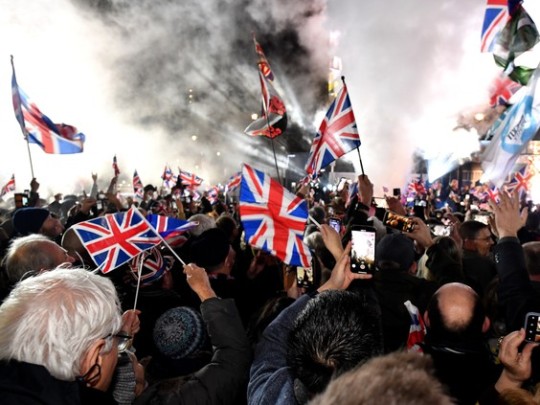
LONDON — Britain’s deranged war on cars, our looming ban on gas boilers, the debanking scandal, the failure to prosecute crime, the attempted cancellation of women, the sabotage of the Brexit agenda, the scale of migration: welcome to anti-democratic Britain, where the beleaguered majority is increasingly subject to the whims of an entitled, activist elite that often seems to despise the people over which it exercises so much power.
All the policies listed above share a devastating commonality: they are deeply unpopular, and would be crushed in a referendum after a fair campaign, were the politicians courageous enough to grant the public a say (in the case of Brexit, they did, of course, and continue to this day to resist implementing the revolutionary change implied by the vote).
In a truly majoritarian society, one where the demos actually exercised kratos, no form of crime would be tolerated, and certainly not burglaries or muggings. Nobody would dare to indoctrinate school children with extreme trans ideology, and the green agenda would be centred around urgent technological innovation rather than seeking to prevent working people from flying to holidays in the sun.
Yet we live in a very different political reality, one in which public opinion is flagrantly disregarded whenever it doesn’t align with the views of the ruling class. Westminster has become cartelized: the large parties are committed to an unrealistic dash to net zero, refuse to discuss the gargantuan cost involved and omit to mention that Britain’s carbon emissions are about three per cent of China’s. On the great subjects of our time — family policy, the size of the state, the NHS and even planning rules — there is little difference between Tory, Labour and Lib Dem MPs, disenfranchising millions.
The intellectual conformity is stultifying, and has been reinforced by the emergence of an all-powerful Blob, the nexus of mandarins, policy advisers, quangocrats and other government agents, a class of “public servants” who don’t really like the public and are increasingly convinced that they have a constitutional duty to constrain and contain elected politicians. They are experts at delay, prevarication and lawfare, and are cheered on by the left-wing activists who have taken over the legal profession, our cultural institutions, academia, charities and even many big companies.
Thus even in the rare instances when the Tories attempt to think the unthinkable and respond to public opinion, as with the Channel crossings, the system does its best to block any change, empowered by quasi-constitutional legislation such as the Equality Act, the Climate Change Act and our membership of the ECHR.
The upshot is an extraordinary disempowerment of the electorate: is it any wonder that some voters fear we risk becoming a democracy in name only? Take the absurd war on cars: a tiny minority of activists, council planners, devolved administrations and ministers are seeking to discourage the mode of transport that the vast majority of the population relies on. Or consider immigration, which is a lot higher than the public would like: all potential solutions to reduce numbers while preserving the economy are lambasted as gimmicks, meaningless or self-evidently stupid. The Tories have promised to cut numbers in every single one of their manifestos since at least the 1990s, and yet aren’t even pretending to try any longer. How does this not disastrously undermine trust in politicians?
Until recently, all parts of British society bought into the democratic ethos developed after the great voting reforms of the 19th and 20th century, or at least paid lip service to it. It was deemed snobbish to dismiss the views of ordinary voters out of hand, and borderline insane to seek to reverse the expansion of the consumer society.
That consensus, already left fragile by the Blairite legal revolution and his massive increase in the number of university graduates, was finally shattered after the 2016 Brexit referendum. Most of our institutions are now controlled by a pseudo-meritocratic elite convinced that only it can prevent the masses from reverting to ignorance, racism and prejudice.
Our new ruling class is paternalistic, messianic even: in a post-religious age, it has taken on the role of priest and saviour of the common people. It still occasionally feels the need to legitimize unpopular ideas by pretending that they garner majority support, hence all the polls “proving” that people support net zero. Yet when asked to pay the price in terms of actual cash or drastically reduced convenience, the public immediately rebels.
There was a time when we worried, rightly, that the tyranny of the majority was the main threat to freedom and prosperity; today, it is the tyranny of the minority that poses the greatest danger. Our new task is to prevent the majority from being oppressed: how do we stop the capture of every institution by the radical left? How do we make Parliament more representative, and reduce the power of the Blob? One answer would be to use a lot more referenda, as the Swiss do; another would be radical reform of the civil service, turning ministers into CEOs with proper control over mandarins.
I’m well aware that the majority can have bad or evil ideas, or vote for maniacs. We need to retain — and in some cases, further develop — protections against majoritarian abuses, even if some of the current ones are no longer fit for purpose or have been hijacked. Elites have helped drive much good social change in recent decades, including by fighting racism and prejudice against all sorts of minorities.
But the pendulum has swung too far away from majoritarian rule, and too much power handed to social engineers. Today, the problem doesn’t lie with the public, which is largely tolerant and liberal-conservative, but with the elites, who have become authoritarian and anti-democratic, captured by wokery and a dislike of material aspiration.
What we call populism, in the current British context, is really the majority trying to reassert itself. Voters are developing a new form of class consciousness; “motorists” are becoming a political force. The Ulez fiasco is acting as a gateway, normalizing opposition to other excesses.
The message to politicians is clear: start listening to the voters again, or else Britain will soon face a popular uprising orders of magnitude greater — and more unpredictable — than Brexit.
The Telegraph
32 notes
·
View notes
Text
Double Olympic 800m champion Caster Semenya was discriminated against by rules forcing her to lower her testosterone levels in order to compete, the European Court of Human Rights has found.
The 32-year-old South African was born with differences of sexual development (DSD) andis not allowed to compete in any track events without taking testosterone-reducing drugs.
On Thursday the ECHR ruled in favour of Semenya in a case involving testosterone levels in female athletes.
A three-time 800m world champion and 800m and 1500m Commonwealth champion, Semenya has been in a long-running dispute with governing body World Athletics since regulations requiring her to have hormone treatment were introduced by World Athletics in 2018.
[...] An ECHR statement read: "The court found in particular that the applicant had not been afforded sufficient institutional and procedural safeguards in Switzerland to allow her to have her complaints examined effectively, especially since her complaints concerned substantiated and credible claims of discrimination as a result of her increased testosterone level caused by differences of sex development."
16 notes
·
View notes
Text
1. Eurostar hints at new destinations as it expands fleet for first time in ten years
High-speed railway operator Eurostar has announced it is working on "thoroughly renewing and expanding its fleet" with up to 50 new trains, while also hinting at extending its services to other destinations. Read more.
2. Brussels' linguistic evolution: English gains ground as French declines
The internationalisation of Brussels is increasingly reflected in the languages spoken in the region. The latest Language Barometer shows almost half of the region's citizens speak English fluently and Dutch speakers are on the rise, while French is losing ground. Read more.
(USA USA USA)
3. 'Proportionate restriction': ECHR upholds ban on Islamic veil in secondary education
The European Court of Human Rights (ECHR) has ruled that it upholds the ban on hijabs in Flemish Community secondary schools. It rejected the applicants' complaint that the ban is incompatible with freedom of religion. Read more.
4. Dubai criminal paradise: Traffickers wanted in Belgium making millions selling UAE property
Several leaders of drug gangs have been able to buy, rent and sell villas and flats in Dubai in recent years, making hefty profits, despite being wanted, prosecuted or even convicted by Belgian law enforcement agencies. Read more.
5. Slovenian Prime Minister first serving EU leader to back 'European right to abortion'
As far-right and populist parties are predicted to make large gains in the forthcoming European elections, progressive leaders from Spain to Slovenia are joining the 'MyVoiceMyChoice' pro-choice campaign to protect women's reproductive rights. Read more.
6. Vietnamese trafficking network: Police close nail salons and arrest 17 people in Brussels
17 suspected members of a human trafficking ring were arrested last month. The suspects have been forcing Vietnamese migrants to work in nail salons in the Belgian capital for years, according to the Brussels Labour Audit Office. Read more.
7. Wallonia unveils 26 summer bathing spots for locals and tourists alike
Wallonia has unveiled 26 official outdoor swimming sites across the region this summer. Read more.
3 notes
·
View notes
Text
European Court of Human Rights finds Russia guilty of human rights abuses in occupied Crimea
The European Court of Human Rights ruled on Tuesday that Russia is guilty of committing systemic human rights violations in Crimea since it annexed the peninsula a decade ago. In its official decision, which comes in response to a complaint filed by the Ukrainian government in 2014, the court said that the Russian-backed occupation authorities in Crimea have overseen documented cases of disappearances, cruel treatment, unlawful detention, and forced citizenship changes, as well as “prosecution and conviction of Ukrainians for their thoughts, expression of views, political stance, and pro-Ukrainian activity, on politically motivated grounds.” Ukraine’s representative for the ECHR, Margarita Sokorenko, called the decision a “crushing decision for the aggressor.”
10 notes
·
View notes
Text
Rishi Sunak warns of “dangerous years” that will change UK life
British Prime Minister Rishi Sunak said on Monday that Britain is at a “crossroads” and needs bold new ideas as it tries to revive waning support for its ruling Conservative Party ahead of a general election, CNBC reports.
In a speech in central London, Mr. Sunak said the coming years would be some of the most challenging in Britain’s history and threats such as war, migration and technology would only intensify.
Mr. Sunak sought to portray the next election, due later this year as a vote on national security, as he claimed he had the “bold ideas” needed to turn things around after 14 years of Tory rule. He said at the Policy Exchange think tank in London:
“I feel a profound sense of urgency because more will change in the next five years than in the last 30. I’m convinced that the next few years will be some of the most dangerous yet most transformational that our country has ever known.”
Sunak said prioritising national security was a guarantee of a secure future for the UK, and said he was prepared to withdraw the UK’s membership of the European Convention on Human Rights, or ECHR, if necessary. He also added:
“Illegal immigration is placing an intolerable strain on our security and our sense of fairness, and unless we act now and we act boldly, this problem is only going to grow.”
The prime minister has previously said he is prepared to ignore ECHR rulings that contradict his basic policy of deporting asylum seekers to Rwanda.
Read more HERE

#world news#world politics#news#europe#european news#uk#uk politics#uk news#england#london#united kingdom#rishi sunak#sunak
3 notes
·
View notes
Text
2 notes
·
View notes